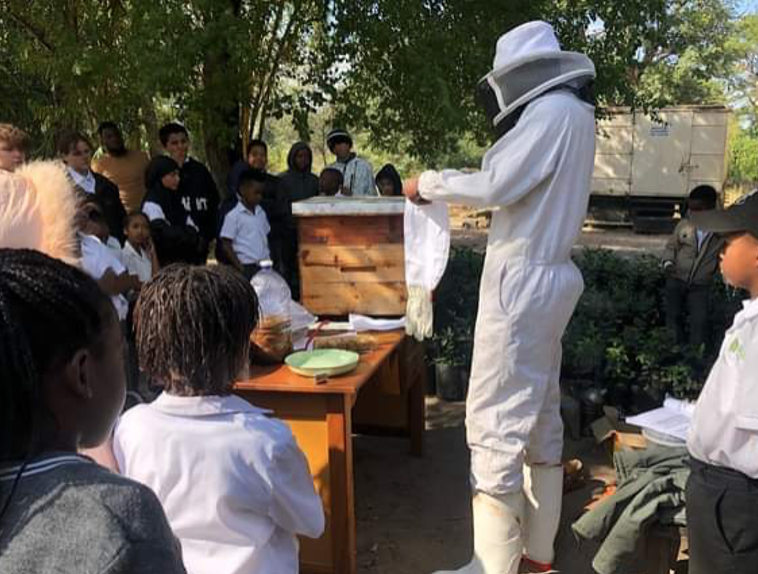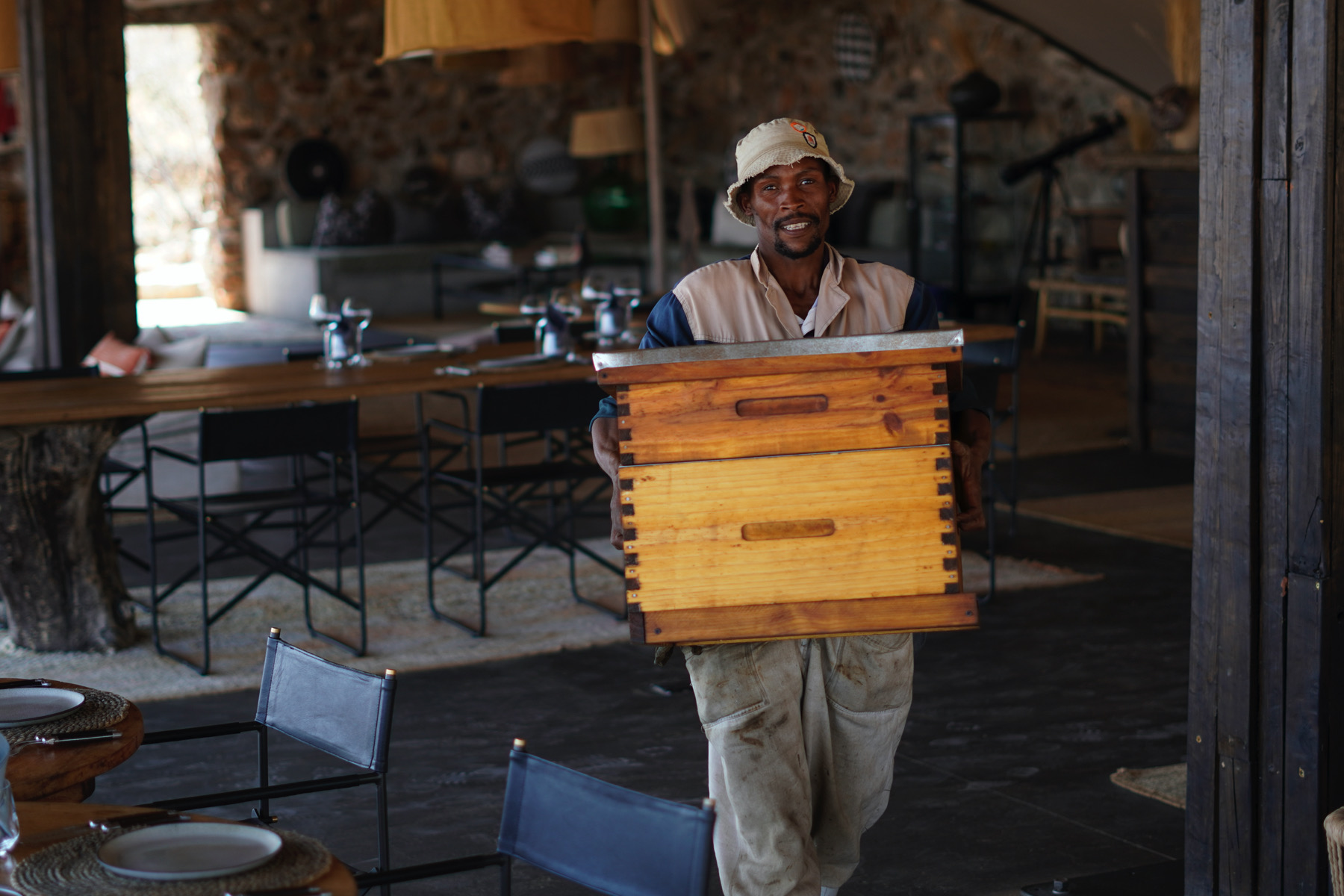About Us
Making the World a Better Place For All of Us
Make a Donation
Join the Movement
A supportive affiliation to “The Beekeeping Association of Namibia”
EXTENDING TO ALL POLLINATORS
- Woman empowerment
- Conservation – fosters scientific program Education & practical training
- Creating awareness
- Cultural heritage
- Development and cooperation bonds between nations
- Adopt international standards of management programs that foster the free flow of ideas with the exchange of knowledge
Wo are we?
A dynamic and diverse group of woman with the same vision formed WOMEN FOR BEES NAMIBIA responding to the local need and urgency for this platform. We learned from past projects in Namibia that mainly initiated beekeeping in rural areas through poverty reduction and woman empowerment programs along with individual efforts. We invested time to learn from records, did surveys and mastered local beekeeping practices through which we identified unique solutions to the challenges of the last three decades.
With this comprehensive outlook a better perspective enabled us to establish new approaches to past problems. As practical local woman beekeepers and woman in complimentary professions the collaboration between this diverse teams produced new strategies and innovative ideas that is implemented to make true differences. We developed long-term networks that weaves through various sectors with multiple functions towards true sustainability. Participating with crosscutting sectors and taking on structured projects gives better practical solutions and support. The development of local support secures networks both nationally and international that takes apiculture in Namibia to advanced levels and brings prospects and opportunities home.
Vission, Mission & Values
We endeavor to follow the example of bees and their work ethics, whom have shown us how to build sustainable communities.
OUR VISION
Our vision is, as inspired by bees, is to set systems in place and establish structures to ensure the development and sustainability of apiculture that uphold our objectives even for future generations.
We, like the worker bees in a hive are sisters, each unique with their own focused task working alongside in synergy to create enabling environments that advances and promotes bees, pollinators, women and youth.
OUR MISSION
Bees have advanced and accurate communication to share information that ensures them to survive, thrive and when ready move to the next location. When a hive has established a structure and advanced to a level were it’s strong enough to sustain itself (with enough resources and bees of all ages fulfilling different functionalities)
A large number of bees of go along with the old queen to a new location already identified by scouts to build a duplicate structure with cycles and systems to progress and ensures regeneration of bees. With bees literally showing us how to build sustainable communities we will build sustainable pioneer projects that we can replicate in different locations with adaptions to different environment, communities and needs to progress and sustain themselves while we create secure long standing supportive networks and structures.
We will continue to weave together strong networks of different crosscutting sectors and practically addressing specific identified needs through fostering programs and doing projects and events. Through programs that regenerate and initiate apiculture, do research, practical training, education and food security programs far greater aspects are addressed that contribute to environmental stability and biodiversity. We envision a countrywide effect with projects, where empowered women and youth take part to increase pollinators, food produce and collaborating with international networks
OUR VALUES
- Integrity & Trust
- Open & inclusive
- Regenerative & Sustainable
- Respect & Quality
- Connected & informative
- Innovative & diverse
- Inspiring & focused
- Persevering & selfless
We endeavor to follow the example of bees and their work ethics, which have shown us how to build sustainable communities.
Our vision, mission and objectives are inspired by the bees from where we still continually learn so much including better communication, practical guides and inter-connectivity to create sustainable ways of living. The inspiring program that was started for woman beekeepers by UNESCO contributed to the realization that a team of local woman beekeepers that was already supporting each other and have courage and perseverance can make a national contribution to several crosscutting sectors and participate globally.
About us
Women For Bees Namibia (WFBN) is a group of women beekeepers and conservationists that supports the Beekeeping Association of Namibia as umbrella body with capacity building, sharing resources, data and in several other practical aspects with complimentary functionalities. We remain a separate entity as civil society organization (CSO), non-governmental organization (NGO) that’s registered legally as a not-for-profit entity, focusing on actively supporting and promoting women, pollinators and the apiculture industry through doing events and projects.
We support and train women, do awareness and educational events to revive beekeepers and projects. We will participate with the Women For Bees International initiative that builds global networks to bring home opportunities and take apiculture in Namibia to international levels. For this to realize and be sustainable it is essential to build capacity, extend networks and gain more local support through weaving collaborative bonds with crosscutting sectors. The active local women beekeeping group of more than 40 women participating does practical training and support individuals, while subcommittees does various supporting functions while our management team mainly focuses on events and projects for:
Creating awareness & fundraising events to protect pollinators for biodiversity
Research & Conservation – fosters scientific programs for environmental stability
Education, youth practical participation, & cultural development with heritage protection
Food security & woman empowerment projects with holistic agriculture approach to apiculture for poverty elevation
Development & adoption of international standards of management programs that foster the free flow of ideas with the exchange of knowledge
Strategic plan
We focus on doing events and projects that support the needs challenges that has been identified and to gain stakeholder support, build networks, to gain funds and members to increase the capacity and uphold our aims. The international and cross-border initiatives increase opportunities and standards that take priority while we place great importance on local support.
The apiculture training initiatives are done through a business plan that will be enrolled throughout Namibia. Individuals and areas are selected carefully to ensure projects will be supported and sustainable after completed. The pioneer projects and participants have to reach a certain level and comply with standards before they are integrated in the network to form part of the supporting structure of the next project. We do the projects lockstep where the participants fully realize the commitment and resources are available to be sustainable. Future prospects and the right individuals are needed to make projects realize, therefore select and aim for quality and not quantity that can train others to grow the industry.
Rendering practical services and focusing on advancing skills, to certain levels, and providing opportunities are important to create enabling environments.
The Team
DIRECTORS & SENIOR MANAGEMENT TEAM
Gretchen Burmeister / Managing Director & Beekeeper
Celeste’ Cramer / Legal documents & advisor
Christelle Tromp / Environmentalist & Research advisor
Karen Reid / Communications, Developing Beekeepers
Kaarina Iita / Marketing,funding & Development beekeeper
Ndawedapo Shaanika / Projects, Developing beekeeper
Wiebke Shlettwein / Advisor, advocate & Senior beekeeper
Ulrike Bekker / Advisor & Human Resources
Our Partners & Sponsors
![tinywow_[Original size] NAMIBIA BEE ASSOCIATION (500 × 300 px) (4)_9584621](http://w4b.et.com.na/wp-content/uploads/2022/12/tinywow_Original-size-NAMIBIA-BEE-ASSOCIATION-500-×-300-px-4_9584621.png)

Bee removal
Bees are frequently in the wrong place, and other factors may necessitate removal action. You may...



